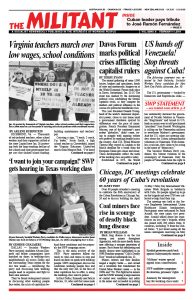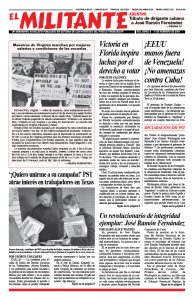RICHMOND, Va. — Thousands of red-jacketed teachers, other school workers and their supporters rallied at the state Capitol here Jan. 28 protesting both the long-standing decline of the schools and state government budget cuts that slashed school funding, building maintenance and teachers’ pay.
Carrying a sign, “I teach, I coach, I’m broke,” Jessie Smith, a high school teacher in Chesterfield, joined the Virginia Educators United-led march from Monroe Park. “I’ve heard three different explanations of the state legislature’s promises, and I still don’t understand them,” she told the Militant.
Virginia Educators United is made up of teachers and other school workers, including members of various unions and those who are not in unions, as well as parents, who want to fight for their demands.
Since 2008 state funding per student has been cut by 10 percent. There are 10,423 fewer school workers today, including 4,000 fewer teachers, while enrollment has jumped by 50,000. Virginia law allows local school districts to raise money to supplement state funding; meaning schools in wealthier areas have more and better paid school workers and supplies.
“The state says that local governments should pay their ‘fair share,’” said Kathy Beery, a reading specialist from Harrisonburg and activist in Virginia Educators United. “What’s being said is that it’s OK to have two-tiers in education based on poverty,” she said.
Beery noted that the majority of students where she works qualify for free breakfast and reduced-lunch programs. She said, “It’s a world problem, the rich are keeping people in servitude.”
Juliane Toce, a science teacher in Richmond told the Militant, “An increase in salary would be a big bonus to getting funding across the board.
“The buildings aren’t safe. The school I teach in is 100 years old. Twice in the last 18 months, storms blew in the 15-foot glass panels. Luckily, at the time there were no children around. There’s a shortage of buses and bus drivers, kids have to sit three-deep on the bus.”
Mathew Bryan, 31, from Dinwiddie County was part of a Carpenters union contingent of 15 who came to show solidarity. “The schools are steadily going down,” he said.
Virginia is marked by stark differences in income and conditions in different parts of the state. With three of the richest areas and highest median household income in the U.S. in northern Virginia — in Loudoun and Fairfax counties, and Falls Church City — teachers can’t afford to live where they work. Some live as far away as West Virginia.
Ayesha Darby, a preschool teacher in Richmond, said her day begins at 6:30 a.m. when she gets her son ready for school. She teaches 5-year-olds from 8:30 a.m. to 3:34 p.m., then picks up her daughter, makes dinner and goes to her second job from 5 to 11 p.m. at Kohl’s. Darby said, “I get one 15-minute break all day.”
“We need to strike,” she said.
As teachers marched in Virginia, school workers in West Virginia reacted to a series of proposed attacks on their unions and working conditions in a new bill submitted to the state legislature. They are discussing a one-day strike. Teachers there started a wave of teacher protests across the country last year fighting for higher pay and more state funds for schools.
Ninety-seven percent of school workers in Mingo County voted Jan. 29 to authorize a strike. The bill they are fighting retains the 5 percent pay raise school workers won in their 2018 strike and protest movement, but it raises class size from 25 to 28, undercuts job seniority, introduces “differential pay” to divide workers, legalizes charter schools and school vouchers and makes it harder for unions to collect dues.
Mingo County is in the heart of West Virginia coal country. The decadeslong tradition of militant miners’ union struggles marked the school workers’ revolt there last year.


